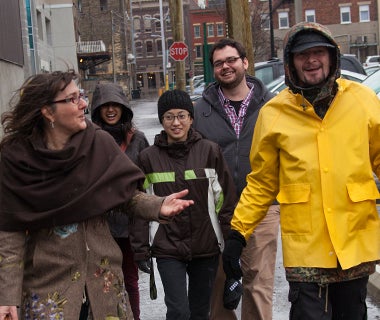
Experiential learning in the streets
Distinguished teacher brings students out of the classroom to talk to homeless people. “I try to encourage deep learning,” says Waterloo prof.

Distinguished teacher brings students out of the classroom to talk to homeless people. “I try to encourage deep learning,” says Waterloo prof.
On a cold day in a downtown alley, a group of young people gather around a man named Duff to listen as he describes what it was like when he lived on the streets.
 They are not from a charitable organization or a church group; they are part of Applied Health Sciences professor, Kelly Anthony’s, fourth year advanced social determinants of health class.
They are not from a charitable organization or a church group; they are part of Applied Health Sciences professor, Kelly Anthony’s, fourth year advanced social determinants of health class.
A proponent of hands-on and experiential learning, Anthony doesn’t believe in just telling—she believes in showing. Students in her social determinants of health class don’t just learn how environmental factors impact health, they see it with their own eyes.
“The material in this course can be transformative,” said Anthony, who is known for her unconventional teaching style.
Teaching outside the box
Rather than giving students a chapter to read about homelessness, Anthony takes students on a guided walking tour with Duff, a man who lived on the streets for more than three years. On the tour, students get a chance to speak with homeless people and see firsthand where they sleep, find food and access medical care.
“It’s intense and personal. But I want students to know that it’s reality, it’s their world,” said Anthony. “It’s also their place in the world and their responsibility as citizens to engage in the community.”
Also, on the syllabus are visits to local shelters, low income residential facilities, and a trip to Grand Valley Institute for Women, a federal prison.
“I want them to experience another model of how we can convey information and ideas. I try to encourage deep learning,” explained Anthony, a teaching fellow in the Applied Health Sciences faculty.
Distinguished Teacher Award
Anthony’s teaching methods are among the kinds of approaches to be discussed at Waterloo’s Teaching Excellence Academy this week. The four-day retreat on campus allows faculty members to examine one of their courses and design a revised course.
This year, Anthony’s innovative approach to teaching earned her Waterloo’s Distinguished Teacher Award.
“While textbook learning is fine, visiting a place like an actual prison and meeting some of the women was an entirely different story,” said Kinshuk Kumar, one of the students who nominated Anthony for the award.
“It brought a level of humanity to what we had been talking about. It gave me a completely new level of understanding.”
At the end of the day, that is Anthony’s ultimate goal.
“I want my class to change the way students think about the world and about health. For better or worse, or better and worse, I want them to see the world, and their responsibilities in it, more clearly.”

Read more
Sport and Recreation Management student Diane Choi embarks on co-op term with the Canadian Olympic Committee

Read more
Redefining capstone learning by bringing students, faculty and community partners together to tackle real-world challenges

Read more
Here are the people and events behind some of this year’s most compelling Waterloo stories
The University of Waterloo acknowledges that much of our work takes place on the traditional territory of the Neutral, Anishinaabeg, and Haudenosaunee peoples. Our main campus is situated on the Haldimand Tract, the land granted to the Six Nations that includes six miles on each side of the Grand River. Our active work toward reconciliation takes place across our campuses through research, learning, teaching, and community building, and is co-ordinated within the Office of Indigenous Relations.